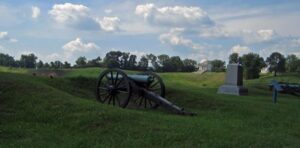Southerners whose relatives fought for the Confederacy during the Civil War are often interested in this significant part of our country’s history. In this edition of Delta Magazine, we wanted to take a closer look at this time period, specifically the Mississippi Delta’s role in the conflict. On page 44 in the March/April issue, writer Noel Workman takes us on an insightful journey of the Delta’s Civil War history.

Part of the war came to my county. The small Mississippi River town of Prentiss was the largest community in Bolivar County during the conflict. According to The History of Bolivar County, a young Walter Sillers, Sr., whose family would later become a part of the state’s political machine for decades, stood on a levee in Prentiss in August of 1862 and watched as Union gunboats approached the town. From some woods located below Sillers, gunfire suddenly rang out from Confederate soldiers and a skirmish ensued. After the fight, Union officers from the 33rd Illinois landed at Prentiss, giving the town’s residents only minutes to vacate. The soldiers then burned Prentiss to the ground. The history of my area also includes Bolivar County resident, General Charles Clark, who served as Mississippi’s Governor during the Civil War. The Burrus home in the southern end of our county, known today as the “Baby Doll House,” also figures into the war. This grand home was used as headquarters for many of the soldiers who passed back and forth from the Confederate army during the war.
All of this research made me curious about my family’s involvement in the Civil War. I found some old family history researched by my relative, Lin B. Clark, who has traced the Coopwood line back to England. My seven times great-grandfather, Benjamin, brought the Coopwoods to the U.S. (Virginia, early 1700s) and he fought in the American Revolutionary War taking up arms against the “Mother Country.” Benjamin’s son, Thomas Coopwood, is the ancestor who brought our line to Mississippi and also served in the Confederate Army. Thomas took his last breath at the Battle of Perryville, Kentucky. According to family writings, a Mason and his wife were walking through the battle field as Union forces were withdrawing. Recognizing that Thomas was also a Mason, the couple stopped to see if they could do anything for him. Realizing the end was near, Thomas gave them the address of his sons and a letter. He instructed the couple to keep his sword and Masonic watch until they could deliver them to his family. Not long after his death, one of Thomas’ sons “…went to Perryville where the man and his wife pointed out the grave, gave the sword and watch to him, and then Thomas Coopwood’s body was returned to Mississippi and placed in the soil he loved so much,” writes a relative.
What is that saying, “The past is always present?” This is certainly true for many Southerners.
– Scott Coopwood, publisher, Delta Magazine
March/April 2013
